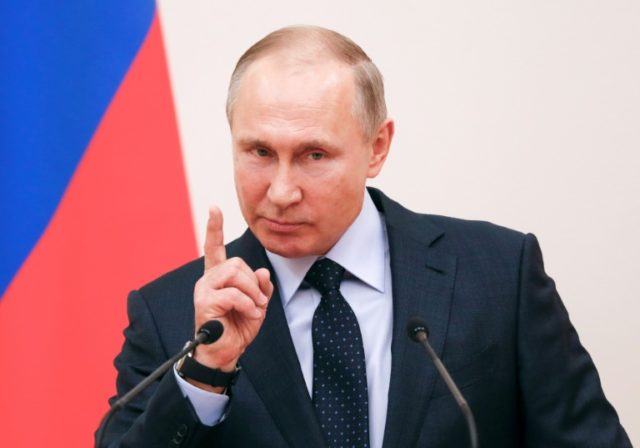Speaking at the annual Victory Day parade in Red Square a few days after his fourth term in office officially began, Russian President Vladimir Putin appeared to compare the United States to Nazi Germany, the menace whose defeat is commemorated on Victory Day.
Radio Farda captures the scene of Putin’s remarks, delivered as troops and heavy weapons rumbled past in a parade intended to demonstrate that Russia remains a military force to be reckoned with:
Thousands of troops marched, and heavy weapons such as Iskander missile launchers rolled across the cobblestone square in a show of might at the start of a six-year term that comes amid severe tension with the West over Moscow’s military action in Ukraine and Syria, among other issues. Warplanes screamed overhead.
“War is always a challenge to life itself, to all the best in it. We remember the tragedies of two world wars, the lessons of history – they do not let us shut our eyes,” Putin said.
“Behind new threats stand the same ugly, old traits: egoism and intolerance, aggressive nationalism and pretentions to exceptionalism.”
As Radio Farda recalls, Putin has given even Barack Obama a hard time about discussing “American exceptionalism,” even though Obama’s view of the subject was famously nuanced. The use of the phrase here, in the outlet’s estimation, is meant to invoke the United States.
President Donald Trump’s perspective on American exceptionalism wins him the veiled comparison to World War II quoted above, despite Putin’s entire public persona being built on a lusty assertion of Russian exceptionalism that portrays him as the second coming of Joseph Stalin, depicted as not so bad, if one does not get hung up on how many Russians he killed.
CNN notes that World War II commemorations like Victory Day have become “the main focus of patriotic expression Russia” since the collapse of the Soviet Union:
“The regime claims to be the direct successor of all Russia’s glorious victories, chief among them the defeat of Nazism in the Great Patriotic War of 1941–1945, and thereby makes itself immune to criticism,” Moscow Carnegie Center expert Andrei Kolesnikov wrote in an essay last year.
The Russian government nurtures a heightened sensitivity about the war and the Soviet sacrifice, and is quick to criticize any attempt to cast the Soviet victory in anything other than heroic terms. Maria Zakharova, the spokesperson for the Russian Foreign Ministry, often devotes a portion of her weekly briefing to castigate governments that have moved or taken down Soviet-era war memorials, seen in some countries as symbols of post-war occupation, not liberation.
This year’s Victory Day celebration featured an enormous military parade that included new Russian equipment such as the Su-57 stealth fighter and the Uran-9 “robotank.”

COMMENTS
Please let us know if you're having issues with commenting.